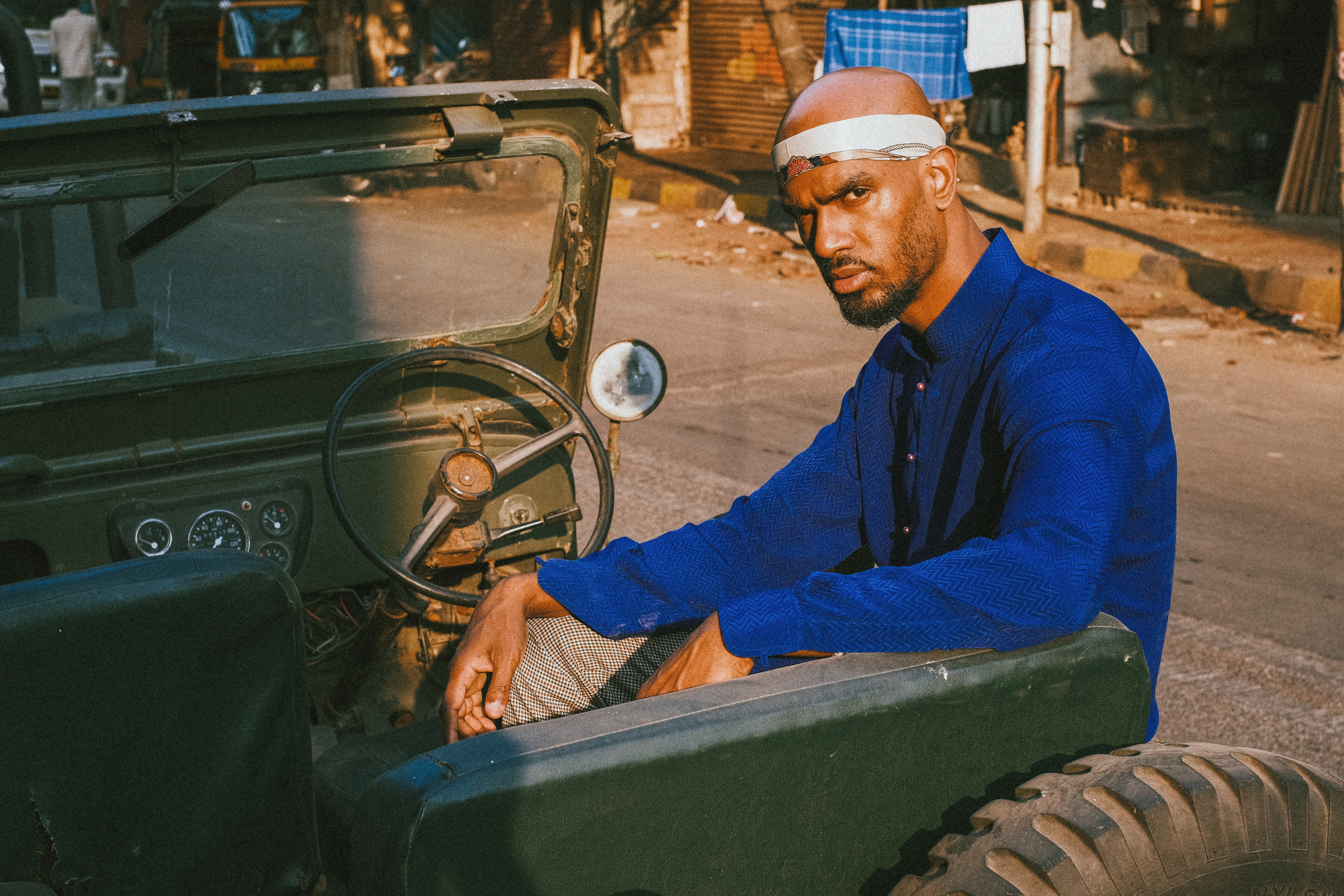
Photograph by Gajan Bala
Shan Vincent de Paul who goes by the moniker SVDP, is a Toronto-based Tamil rapper and director. His debut album "Saviors" was released in 2016, followed by his sophomore album "Trigger Happy Heartbreak" in 2017. Shan has released a song from his upcoming album "Made in Jaffna" - titled "One Hundred Thousand Flowers".
The song reflects on the Tamil genocide. It shares name with a foundation newly founded by Shan, which aims to foster music, arts and culture for the Tamil community globally, with an emphasis on youth and those who have been affected by the armed conflict in the Tamil homeland.
We caught up with Shan to delve into the process behind "One Hundred Thousand Flowers".
"One Hundred Thousand Flowers"
Born in Jaffna, Shan Vincent de Paul and his family fled the island in 1986 and arrived in Canada as refugees. The now Toronto-based Tamil artist's lyricism, flow pattern and delivery shows that he is no stranger to the art of rap. Through his discography, Shan wields the power of language to energise the listener. Language is a powerful tool within the Tamil collective imagination. Whilst the Tamil script is likened to the "soul" and "body" of a person, it comes as no surprise that the Tamil diaspora has birthed many artists, like Shan, who embrace the power of their mother tongue as well as the language of their host nation.
The trauma of genocide is etched into the consciousness of the Tamil nation. "One Hundred Thousand Flowers" is Shan's personal cathartic release of "rage", "sadness" and "helplessness" when dealing with the ongoing issue.
"One Hundred Thousand Flowers" is a song which he deems the "most important of his life" and one he has been meaning to "write for his whole career." Whether it was due to not having the right production, feeling like he wasn't a sharp enough lyricist or not knowing how to capture a significant part of the nation's history in three minutes, Shan was unable to put his ideas into action, until now. Shan states the "timing had to be right" and his time taken to process his "mixed emotions" and release his frustration and anger has resonated far within the Tamil community.
"It was important to me that every bar was significant" he says, and he achieves this. Shan directly addresses the genocidal nature of the Sri Lankan state highlighting historical and ongoing issues. The burning of Jaffna Library, the 'white flag incident', the duplicity of international organisations in the final months of the conflict, the shelling of hospitals committed by the government, the plight of the mothers of the disappeared and the paradoxical notion that Sri Lankan is a "paradise island" with government owned tourist resorts being built on "mass graves". This just comes from one verse.
When asked why this was the most "important song of his life" he responded:
"Because it's bigger than myself. It represents a very dark part of our community's history that is not to be taken lightly or tampered with. As an artist, I'm ok with failing or missing the mark when it comes to telling my own personal story. However, with this song, I know what it will mean to our community, I know how triggering it can be. There is a level of sensitivity with this that it not comparable to my other material."
Shan's ability to provide catharsis to each listener comes from his immersion into his own vulnerability and pain. He is able to tap into the community's collective pain, transforming that in to a shared grieving process which by the third act leaves us invigorated with the punk chorus production crafted by La+ch, a producer and member of the Toronto based artist collective sideways. All in less than three minutes.
Listen to the full song below:
"Now reap the wrath of God!"
The concept of God and Shan's personal relationship with "God" or a higher power have formed central themes on his previous projects and again are found in this latest release. "Thank God" from his debut album "Saviors" and "Walk on Water" evoke the idea of "God" but from different persepctives. Shan describes himself as "not religious" but states that this idea of God or a "higher power" is that of a "creator that represents balance, love and unity."
"Walk on Water," a track released in 2017 can be interpreted as a song which pays homage to the hundred of thousands of Eelam Tamils who were forced to cross oceans to seek refuge, to in a sense "walk on water" and perform "miracles" to survive and keep their families safe. When asked about his use of God in "Walk on Water" Shan said:
"That God is seen through our perseverance, our unity and ability to stand with each other."
The Tamil nation has seen so much pain and destruction but has always risen from ashes, so to evoke a comparison with "God" through the stories of its people is a testament to the resilience of the community.
"The evils of men do not go unpunished by the higher power...You can't continuously oppress, kill and inflict pain on other without expecting consequences. We as a Tamil community have not seen those consequences carried out through the justice system, but the force of God does not forget," Shan says.
The cathartic nature of the song touches all aspects of trauma inflicted on the Tamil community, one being the disgraceful response of the international community and bodies in bringing about justice and accountability. The road to justice is long and as Shan uses his music to highlight, the "force of God" can be found in any one of us and our stories. It is this force which resistance and resilience are born from.
"Bet on blood! That the taste of reparations gets me high!"
"I think resistance comes in many forms. Through our success as a community, through protests, through art, our unity, our resilience, our ability to mobilise and most importantly fight for those who are most vulnerable," Shan says.
"One Hundred Thousand Flowers" mentions the mothers of the disappeared, embodiment of resistance and resilience in the post-2009 Tamil space. The International Day of the Victims of Enforced Disappearances, was on August 30th. The civil society group of the families of the disappeared which are primarily led by women, organised protest marches across the North-East even under heavy police and military intimidation. Their strength is exemplary, as they have been continuously protesting for more than 1,200 days and continue to do so even under arguably the most racist Sinhala-Buddhist nationalist government to be at the helm of power.
Shan is frank about the perceived effect his medium of art can have.
"I don't expect one song, or piece of art to change the world, but I do believe that art is powerful enough to inspire people to take action."
He hopes the song will "plant seeds" that can leader to "larger conversations in our society." The Tamil nation is one that is found in the past, present and the future. The medium of art which highlights the pressing issues of the present will always resonate within the larger community, a form of documentation when the mainstream narrative attempts to erase the truth, our truths. Shan ensured that the topic was captured with sensitivity.
"It's a new dawn now!"
The song can be split into three distinctive acts, all which touch upon a separate theme. The first theme is the collective trauma inflicted upon the Tamil community and the duplicity of the Sri Lankan state, the second is the anger which this trauma caused and the resistance it spurs and the third, focuses on the idea of justice, reparations and the power of the diaspora.
The third act starts off with the lyrics:
"We've been on the prowl all night up in the Six." This is a reference to Toronto which has the largest population of Eelam Tamils outside of the homeland. When asked about the role the diaspora plays in attaining justice, Shan comments:
"Many of us who are part of that diaspora can reflect on the war from a position of privilege. We are fortunate enough to be in a place where we didn't have to suffer first-hand. With that privilege, I believe we have a deep responsibility to attain justice for those who are still suffering."
Shan goes on to say that "through social media, and other various networks around the world, it is important we use our power and privilege to shed light on what happened and what is still happening. For us to turn a blind eye to those who are continuously being oppressed would make us just as guilty as the oppressor."
It is talent and collaboration within Tamil diaspora which helped shape the production and sound of "One Hundred Thousand Flowers." Yanchan, a talented Tamil producer and artist who Shan believes can have a "global impact" with his production style, was responsible for the formative part of the song.

Photograph by Alexander Lam
Shan details the process:
"The song actually was sparked when Yanchan played me a very rough version of the beat. We were wrapping up a studio session for our song "Overtime", and just as he was about to leave, he played me the beat. I immediately heard the power and potential in the production and told him to send it to me. After sitting on it for a few days, "One Hundred Thousand Flowers" started spilling out. I got La+ch on board afterwards to take the song to the next level and add the punk chorus."
Shan's next album is titled "Made in Jaffna", and it is set to be an autobiographical album focusing on his journey as a Tamil artist, his family's journey form the homeland to Toronto and his subsequent upbringing in the city. Shan hopes the project will give the listener a glimpse into who he is as a person and an artist.
When asked about the style of the album, Shan said,
"It's also a lot more rap heavy than my previous projects, I think "One Hundred Thousand Flowers" is pretty reflective of that. It's pretty cliche to say your new project is your best work, but seriously, it's my best work."
"Made in Jaffna" by Shan Vincent De Paul is releasing at the end of September. Check out Shan's Instagram and Twitter.
